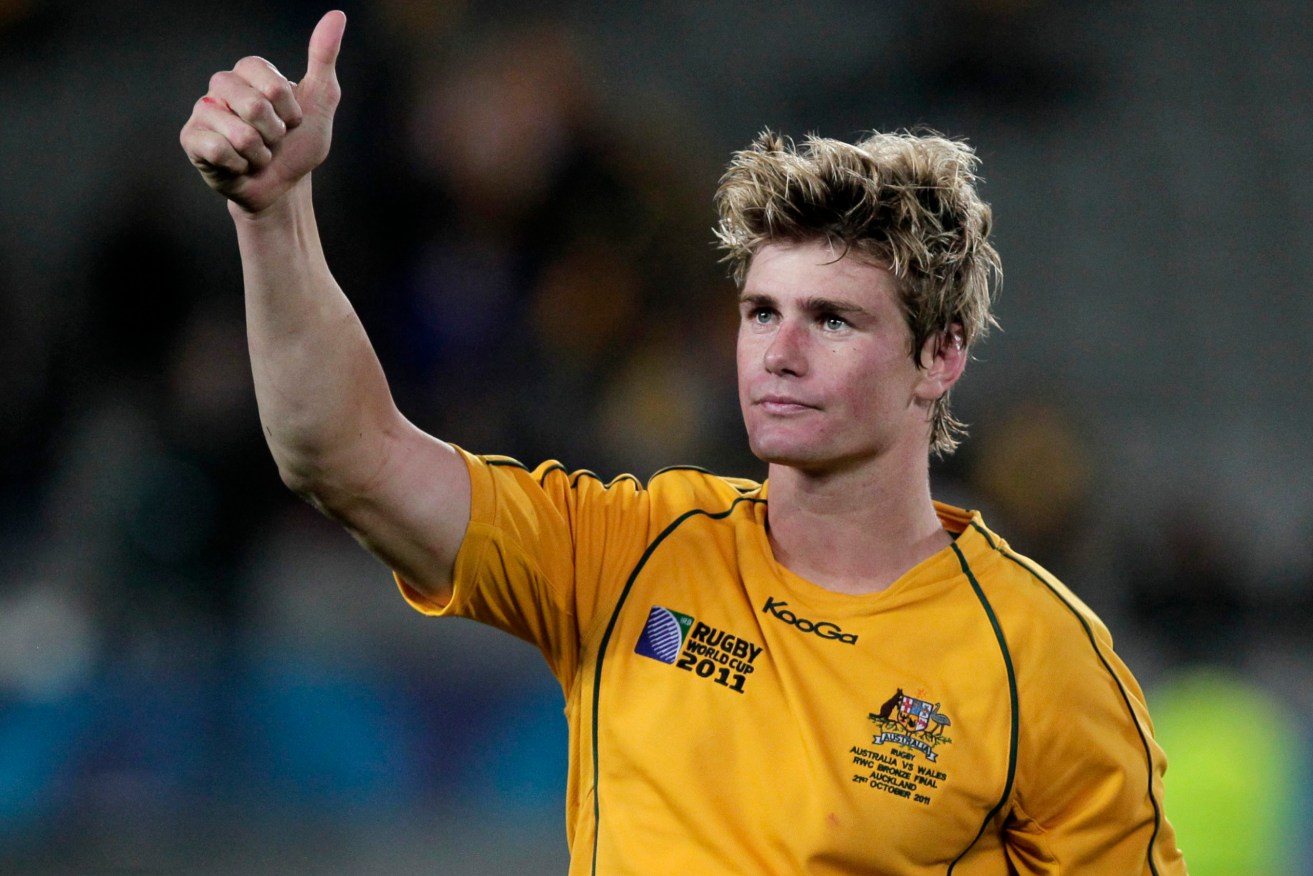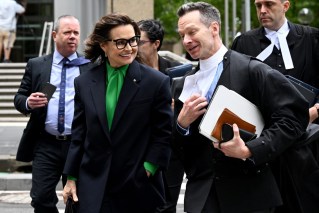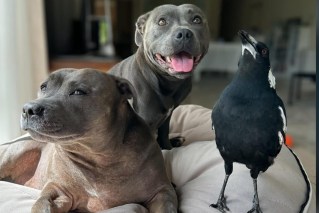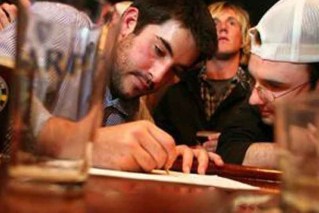Half a lifetime in the frontline – Kingaroy boy puts it all down to experience
A one-time Broncos teenage prodigy has hung up his boots – but for Berrick Barnes the journey is just beginning, writes Michael Blucher.


Australia's Berrick Barnes acknowledges the crowd after his team's victory over Wales in the bronze medal Rugby World Cup game at Eden Park, in Auckland, New Zealand, Friday, Oct. 21, 2011.(AP Photo/Mark Baker)
In middle age, there’s no shortage of reminders of just how fast time is ticking by.
It might be the sight of one of your mate’s kids, who you remember as a toddler, all of sudden, standing at a bar, with a beard, chugging on a stubby of Peroni.
Or like last week, stumbling across the date of birth of the Prime Minister, and realising when you were at uni, he was still colouring in books at primary school.
Granted, I was still at uni when ScoMo left high school, but that’s a discussion for another day.
I had another unsolicited reminder of time passing recently when I heard former Wallaby, Red, Waratah, Bronco and Kingaroy Ant, Berrick Barnes, had retired from all football.
It seemed like only a couple of years ago that Barnes was riding his bike to Broncos training, for the simple reason he wasn’t old enough to have his driver’s licence.
And yet here he is today, a wisened, soon-to-be 34-year-old, married with two children, calling “fulltime”, resigned to the fact that his badly battered body can no longer withstand the jarring effect of heavy weekly collisions.
By most measuring sticks, Barnes can lay claim to an admirable professional football career.
After just one season and nine first-grade NRL games under Wayne Bennett at Red Hill, he left league and joined the Rugby ranks, commencing a journey that would feature two World Cups, 50-plus Tests for his country, 100-odd Super Rugby games, but most importantly for the man with the number on his back, the opportunity to explore practically every corner of the globe.
Travel. Beyond the playing, that’s what floated Berrick Barnes’s boat. Travel and meeting people.
He was known among his teammates as “the reverse bandit” – the player who wouldn’t stop pestering the fans. Asking them questions – how were they going, where were they from, where had they been, where were they going next … “Can I get ya a drink? Whadda ya havin’?”
After the Wallabies were knocked out of 2007 World Cup in France, his teammates flew home to Australia immediately. Barnes went backpacking in Italy.
Five-star hotels and three anything-you-could-imaginably-want-to-eat buffet meals a day turned into tinned spaghetti in a youth hostel kitchen, all within the unlacing of a boot.
The results on the field were important, bloody oath they were. But so too was the experience.
Sadly, Australian rugby fans never really got to know Barnes on account of the fact he spent so many seasons playing in Japan. He went up there at the age of 27, not only for the money, but for the experience. To see another country, to experience another culture.
For six or seven seasons with the Wallabies, he was that “reliable, hard-working bloke in the head gear”, who kicked goals, tackled courageously and often got injured.
He’d win games and quite a few “Man of the Match” awards, but then he’d get injured. He’d get knocked out. That happened quite a bit.
During his Wallabies days, most of the spotlight shone on his backline comrades, the preciously talented trio of Kurtley Beale, Quade Cooper and James O’Connor.
You’d never get Barnes to admit it, but Huey, Dewie and Lewie were much better human beings when the down-to-earth country kid from Kingaroy was with them in the squad. Keepin’ shit real.
Robbie Deans, the former Wallabies and All Blacks coach, who coached the utility back for 10 of his 14 seasons playing rugby, was recently asked to appraise Berrick Barnes’s football career.
“Bloody hard worker, very versatile, and a great team man,” Deans said. “If I had to select a Good Blokes’ XV from all the rugby players around the world, Berrick would be one of the first I picked.”
Pretty good wrap, that. Robbie Deans encountered quite a few in his time.
Only now with the boots in the cupboard can we tell the story of Barnes in 2007, almost coming to blows with Eddie Jones, the year he coached the Queensland Reds.
Barnes deemed that Jones, a notoriously hard taskmaster, was giving one his teammates an unnecessarily hard time.
In a team meeting, he called him on it. Jones bit back. Barnes refused to back down. Jones exploded. That fearsome squint quickly became even more pronounced. “Anybody else got anything to say?” Jones snarled, in his trademark nasally voice, looking for further blood.
Crickets. Not a word.
Barnes knew everybody in the squad felt exactly the same. As a team leader, he was well aware of the mood in the squad. They were all filthy. But Eddie Jones in full cry … yikes.
After the meeting, many would privately apologise for their absence of courage.
The next day, Barnes apologised to the coach for his impertinence, but it took years for their relationship to thaw.
“Not my best move,” he said. “I was probably very naive, but I’d been brought up to tell the truth. I don’t regret what I did. I think honesty in any team environment is very important. But I could have picked a better time and place.”
Barnes does, however, have other regrets, most of which centre on what he didn’t do, rather than what he did do.
“I wish I’d backed myself more,” he reflected. “I was so worried about letting people down. I can remember before games being physically sick at the thought of not living up to my teammates’ expectations.
“During some games, I’d have a kick for goal, and I could feel my legs shaking. I was thinking “What if I miss it. What will the boys think?” I was shit scared of failure.
“But in Japan, I got comfortable in my own skin. I changed the focus from myself to others. At (his club) the Panasonic Wild Knights, we had a lot of guys who worked all day and yet when they came to training, they were still prepared to put in 90 minutes of extras.
“I was like – Wow, how good? I started thinking – how can I help them? What role could I play in making them better Rugby players? And the weight of expectation lifted from my shoulders.”
In six seasons, he won three national championships and not insignificantly, two MVP awards – the most valuable player in the entire Japanese domestic competition.
Exactly what the future holds, Barnes isn’t exactly sure. Not yet. He’s exploring his options. There’s already a few things on the go, including a sports podcast, Ball and All. that he’s just started with his mates, Woodsy and Condo.
In true Kingaroy style, he’s keen to give back to the game (or games) that have served him so well. Perhaps do some coaching.
Like he was on the football field, Barnes is in no rush, but he’s not going to sit around wasting time. either.
Like the rest of us, he’s worked out that time is valuable.
And it moves pretty quickly.













